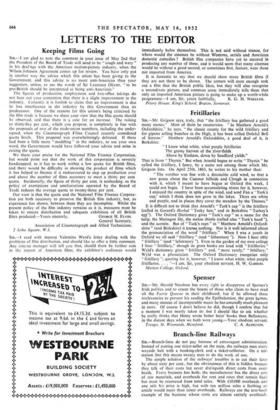Fritillaries
SIR,—Mr. Grigson says, truly, that "the fritillary has gathered a good many names." Most of them he enumerates. "In Matthew Arnold's Oxfordshire," he says, "the classic county for the wild fritillary and for gipsies selling bunches in the High, it has been called Doleful Bell of Sorrow." Matthew Arnold's Oxfordshire, a good deal of it, is Berkshire:
"I know what white, what purple fritillaries The grassy harvest of the river-fields Above by Ensham, down by Sandford yields."
That is from " Thyrsis." But when Arnold began to write " Thyrsis " he called the fritillary, I fancy, by a name not among those which Mr. Grigson lists. On April 25th, 1863, he writes to his mother thus:
"The weather was fine with a detestable cold wind, so that a new poem about the Curnnor hillside and Clough in connection with it, which I meant to have begun at Oxford this week, I could not begin. I have been accumulating stores for it, however. I enjoyed the country in spite of the wind, and send Fan a 'Turk's cap,' which I think does "not grow in the lakes. There are white and purple, and in places they cover the meadow by the Thames."
It is difficult not to think that Arnold's "Turk's cap" is the fritillary (called in Gerard's Herbal "Turky hen," and in Berkshire "Turkey's egg"). The Oxford Dictionary gives "Turk's cap" as a name for the tulip, the Martagon lily, the melon thistle (called also "Turk's head "), and the aconite. But of "Turk's caps" in "Matthew Arnold's Oxford- shire" (and Berkshire) it knows nothing. Nor is it well informed about the pronunciation of the word' "fritillary." When I was a youth in Oxford we all said " fritillary " (and "laboratory "). Now I hear ohly " fritillary " (and "laboratory "). Even in the garden of my own college I hear "fritillary," though its grass banks are loud with "fritillaries." Wyld's dictionary gives " fritillary " and, "more rarely," "fritillary." Wyld was a phonetician. The Oxford Dictionary recognises only "fritillary "; quoting for it, however, "I know what white, what purple fritillaries. . . . "—I am, Sir, your obedient servant, H. W. GARROD.
Merton College, Oxford.


































 Previous page
Previous page